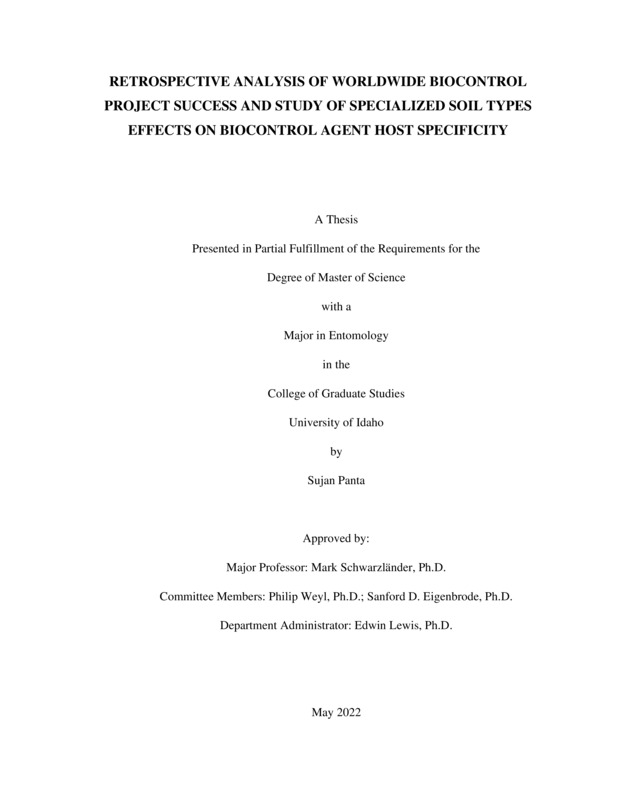RETROSPECTIVE ANALYSIS OF WORLDWIDE BIOCONTROL PROJECT SUCCESS AND STUDY OF SPECIALIZED SOIL TYPES EFFECTS ON BIOCONTROL AGENT HOST SPECIFICITY
Panta, Sujan. (2022-05). RETROSPECTIVE ANALYSIS OF WORLDWIDE BIOCONTROL PROJECT SUCCESS AND STUDY OF SPECIALIZED SOIL TYPES EFFECTS ON BIOCONTROL AGENT HOST SPECIFICITY. Theses and Dissertations Collection, University of Idaho Library Digital Collections. https://www.lib.uidaho.edu/digital/etd/items/panta_idaho_0089n_12362.html
- Title:
- RETROSPECTIVE ANALYSIS OF WORLDWIDE BIOCONTROL PROJECT SUCCESS AND STUDY OF SPECIALIZED SOIL TYPES EFFECTS ON BIOCONTROL AGENT HOST SPECIFICITY
- Author:
- Panta, Sujan
- Date:
- 2022-05
- Keywords:
- Biocontrol host specificity life history traits serpentine soil Weed biocontrol
- Program:
- Entomology, Plant Path & Nematology
- Subject Category:
- Entomology
- Abstract:
-
Classical biological control of weeds is an important tool for weed management practiced around the world. However, it is not always successful. Examining historical records of biocontrol efforts would be an alternative approach to understand biocontrol agent and target weed traits correlations with success. The second chapter of this thesis is a review examining life history traits of biocontrol agent and target weed life history traits associated with biocontrol establishment and impact using the 5th edition of ‘Biological Control of Weeds: A World Catalogue of Agents and their Target Weeds’ and other reports of biological control agents and target weed traits. This analysis showed that both biocontrol agent and target weed life history traits influenced the success of biological control programs, with the traits of agents more important than those of the weed. The analysis is intended to inform biological control practitioners of the importance agent and weed life history traits for establishment and successful control of weeds. Chapter 2 also revealed that biocontrol candidate agents are typically exposed to test plant species grown in nutrient-rich homogenous soil, but this could influence the susceptibility of herbivory that are adapted to special soil types, for example nutrient-poor metal-rich serpentine soil. Therefore, in the third chapter of this thesis, I tested these hypotheses in our system, the invasive weed, Lepidium draba L. (Brassicaeae), several nontarget species related to this weed and a biological control candidate, the stem and petiole gall-forming weevil Ceutorhynchus cardariae Korotyeav (Coleoptera: Curculionidae). Results showed that native serpentine soil influenced C. cardariae herbivory. Our data show that native species confamilial with the target restricted to specialized soil types may be at less risk of herbivore attack than predicted based on tests conducted in horticultural soil.
- Description:
- masters, M.S., Entomology, Plant Path & Nematology -- University of Idaho - College of Graduate Studies, 2022-05
- Major Professor:
- Schwarzländer, Mark MS
- Committee:
- Weyl, Philip PW; Eigenbrode, Sanford SE; Lewis, Edwin EL
- Defense Date:
- 2022-05
- Identifier:
- Panta_idaho_0089N_12362
- Type:
- Text
- Format Original:
- Format:
- application/pdf
- Rights:
- In Copyright - Educational Use Permitted. For more information, please contact University of Idaho Library Special Collections and Archives Department at libspec@uidaho.edu.
- Standardized Rights:
- http://rightsstatements.org/vocab/InC-EDU/1.0/

